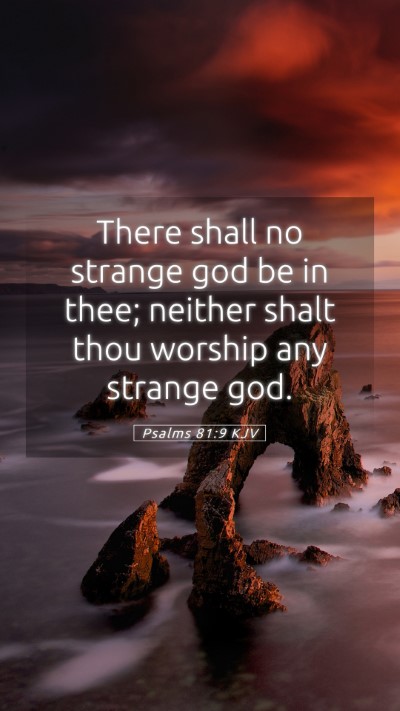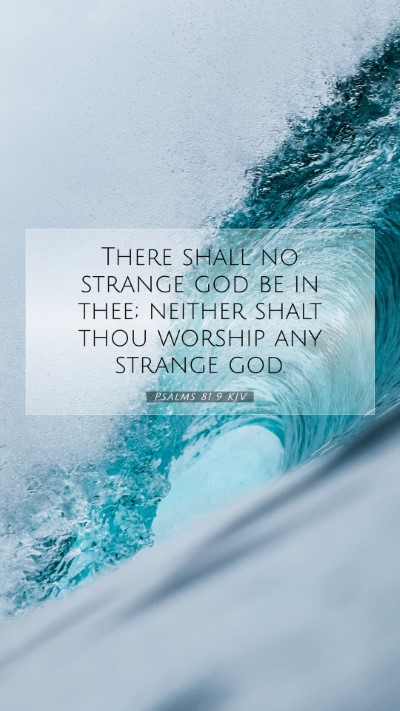Psalms 81:9 - Meaning and Interpretation
Bible Verse: Psalms 81:9
Verse Text: “There shall no strange god be in thee; neither shalt thou worship any strange god.”
Overview and Context
This verse comes from a psalm attributed to Asaph, one of the prominent leaders of worship in ancient Israel. Psalms 81 emphasizes God's desire for His people to recognize and worship Him exclusively, devoid of any foreign influences or idols. This passage directs attention to the fundamental aspect of monotheism that was central to the Jewish faith.
Bible Verse Meaning
General Interpretation: The command against worshipping strange gods serves as a reminder of the importance of fidelity to God. It implies the dangers of syncretism, where the sacred traditions of one faith might mix with those of another, leading to a diluted spiritual practice.
- God's Exclusivity: Matthew Henry emphasizes that God demands exclusivity in worship. This reflects His sovereignty and love for His people, urging them to remain loyal.
- Danger of Idolatry: Albert Barnes discusses how the Israelites, surrounded by pagan nations, were frequently tempted to adopt foreign practices. The admonition serves as a warning against such temptations.
- Call to Purity: Adam Clarke notes that this verse addresses the purity of worship. True worship excludes all false deities, which can detract from a faithful relationship with God.
Detailed Exegesis
The theological implications of Psalms 81:9 extend into the realms of both personal and communal worship. It invites believers to engage in self-examination regarding their personal idols, whether they be materialism, relationships, or other distractions that take precedence over devotion to God.
1. Historical Context
The period in which this psalm was written was marked by the Israelites’ struggle against sin and corruption. Their history of falling into idol worship necessitates this reminder of God's singularity. Understanding the historical backdrop helps us appreciate the urgency of the call in the verse.
2. Application in Daily Life
Believers can apply this verse to guard their hearts against modern-day “strange gods,” which might include secular ideologies, materialism, or any personal pursuits that overshadow their commitment to God. It encourages a conscious effort to prioritize spiritual integrity in one’s life.
Related Insights from Commentaries
According to various biblical scholars, the worship of strange gods is not merely a historical issue but remains relevant today. The teachings from Matthew Henry, Albert Barnes, and Adam Clarke collectively remind believers of the portrayal of God as a jealous God throughout the Scriptures and the enduring principle that worship should be dedicated to Him alone.
Cross References
- Exodus 20:3: “Thou shalt have no other gods before me.” - The foundation of God’s command against idol worship.
- Deuteronomy 6:14: “Ye shall not go after other gods.” - A warning against following the practices of neighboring nations.
- Isaiah 43:10: “Ye are my witnesses, saith the LORD, and my servant whom I have chosen.” - This ties the concept of exclusive worship to Israel's identity as God's chosen people.
Conclusion
Psalms 81:9 serves as a vital reminder of the need for undivided loyalty to God. Proper understanding of this verse involves appreciating its historical context, recognizing its relevance today, and applying its message to personal life and worship practices. Engaging with this text not only enriches Bible study insights but also strengthens one's relationship with God through a commitment to worship Him alone.
Keywords: Bible verse meanings, Bible verse interpretations, Bible verse understanding, Bible verse commentary, scripture analysis, biblical exegesis, Bible study insights.
Related Bible Study Topics: How to interpret Bible verses, understanding difficult Bible passages, applying Bible verses to daily life.


